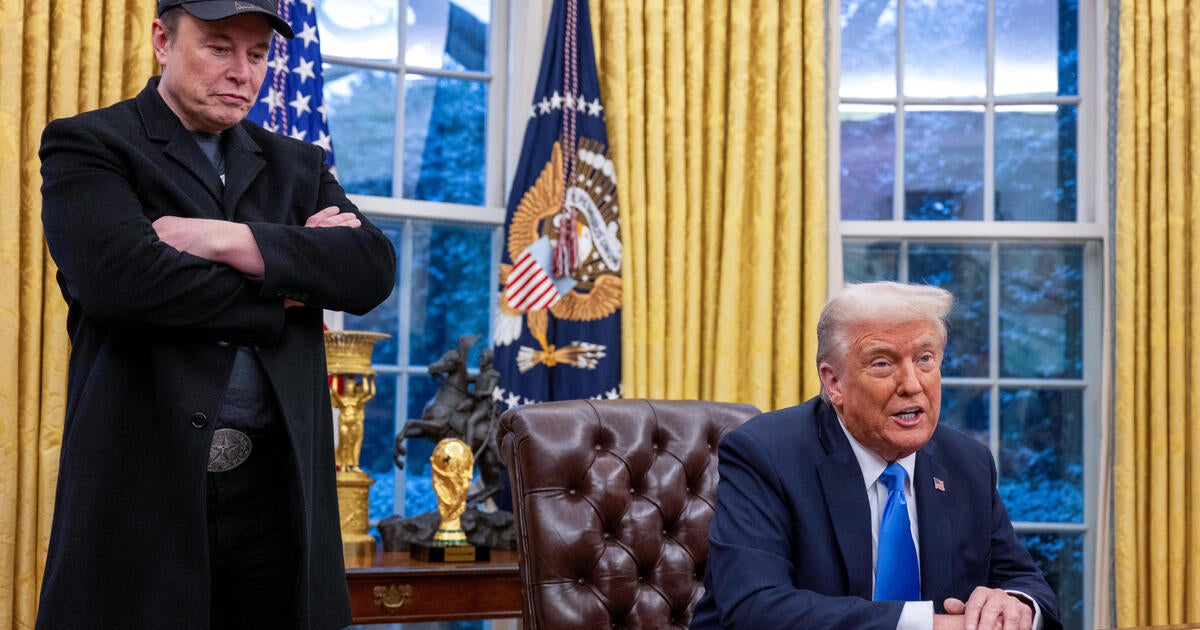“We’re thinking about giving 20% back to the American citizens and 20% back to pay down debt,” Mr. Trump said at the FII Priority summit, an investment conference in Miami sponsored by Saudi government entities. Mr. Trump didn’t provide further details.
The idea of the so-called DOGE dividend surfaced on social media this week when a four-page proposal was posted by an X user, James Fishback. The post caught the eye of Musk, the owner of X, who is spearheading DOGE, and who on Tuesday said he would pitch the idea to Mr. Trump.
According to Fishback’s calculation, 20% of the supposed $2 trillion in eventual DOGE savings would be provided to some taxpayers in the form of a direct tax rebate, which he estimated at $5,000 per household. Only households with a tax liability would receive the payment, which means lower-income households that generally don’t owe income taxes wouldn’t be included.
But economists and policy experts said the plan isn’t likely to materialize, citing the implausibility of finding anywhere near $2 trillion in federal cuts, as well as the legislative hurdles in approving such a direct tax payment.
“It is completely impossible for DOGE to save $2 trillion,”Jessica Reidl, an economist and senior fellow at the Manhattan Institute, a conservative-leaning think tank, told CBS MoneyWatch. “Two-thirds of the $7 trillion federal budget goes to Social Security, Medicare, defense, veterans and interest on the debt — all of which has been taken off the table by President Trump.”
She added, “Saving $2 trillion would require eliminating nearly every remaining federal program. DOGE has no legal or constitutional authority to cut this spending; Congress must pass a law and that will not happen.”
Two-thirds of the nation’s $6.7 trillion in annual spending is mandatory commitments through programs including Social Security and Medicare, while discretionary spending is largely spent on defense. In a Feb. 18 interview on Fox News’ “The Sean Hannity Show,” Mr. Trump reiterated his earlier vow that Social Security and Medicare cuts are off the table.
“Social Security won’t be touched, other than fraud or something,” Mr. Trump said during the interview. “We’re going to find it’s going to be strengthened, but won’t be touched. Medicare, Medicaid, none of that stuff is going to be touched.”
On Feb. 19, Mr. Trump backed the House Republicans’ budget proposal, which, if enacted, would include deep cuts to Medicaid, the nearly $900-billion-a-year government health insurance program that serves about 79 million mostly low-income or disabled Americans.
The White House didn’t immediately reply to a request for comment.
DOGE cuts
As of Wednesday, DOGE claims it has made cuts that add up to about $8.4 billion, according to the task force’s own documentation.
While DOGE has only been operating since Mr. Trump was inaugurated on Jan. 20, its cuts are far from reaching Musk’s stated goal of shaving $500 billion in annual government spending, let alone reaching near $2 trillion, experts noted.
The plan “is very unrealistic,” Alex Nowrasteh, vice president for economic and social policy studies at the Cato Institute, who describes himself as a libertarian, told CBS MoneyWatch. “I’d love to see it, but I think that is unrealistic, especially in the first year, and certainly unrealistic without Congress getting involved.”
Any new tax refund check would need the approval of Congress, which controls government spending and is in charge of crafting tax laws. But House Republicans are currently negotiating a budget proposal that would enact trillions of dollars in spending cuts to pay for an extension of Mr. Trump’s 2017 tax cuts, as well as other tax provisions the president promised on the campaign trail.
A DOGE dividend “will make their numbers even harder to work in the budget reconciliation,” Alex Jacquez, chief of policy and advocacy at Groundwork Collaborative, a Washington, D.C.-based left-leaning economic think tank, told CBS MoneyWatch. “It’s hard to see how to make the math work.”
While a plan for some kind of DOGE dividend could materialize, it would doubtless be a much smaller amount than envisioned, given the practical impossibility of finding $2 trillion in federal cuts.
Experts noted that rebate checks are typically issued in times of economic stress, such as during the pandemic, when Congress authorized several rounds of stimulus checks. But the U.S. economy today is viewed as strong, given growing GDP and low unemployment, they added.
At the same time, the federal government’s annual outlays are outpacing revenue by about $2 trillion, creating budget deficits and sending the nation’s debt to a record $36.2 trillion.
Reidl noted, “Washington is facing annual budget deficits that will likely surpass $3 trillion within the next few years. Sending taxpayers dividend checks would be completely irresponsible.”
DOGE facing legal issues
Experts also raised the issue of whether DOGE’s cuts could be reversed by the courts, given that the group is facing multiple lawsuits over its access to sensitive data across various agencies as well as over the legality of its creation.
“I’m happy to see [DOGE] identify things that can be cut, but I do have concerns about the legality of it,” Nowrasteh of the Cato Institute said. “Congress appropriates money, and having the presidential quasi-commission go around and cut things seems like it would run afoul of a lot of laws.”
DOGE’s savings so far could “be reversed by the courts for bypassing Congress,” Reidl noted.
Given the challenges of trying to find anything close to $2 trillion in savings, as well as the legislative issues in passing a tax rebate check, experts said their advice to taxpayers is not to bank on getting a DOGE dividend.
“I wouldn’t be budgeting a $5,000 expense in the near term,” Jacquez said.
DOGE
#Trump #hell #DOGE #dividend #checks #Economists #payments



